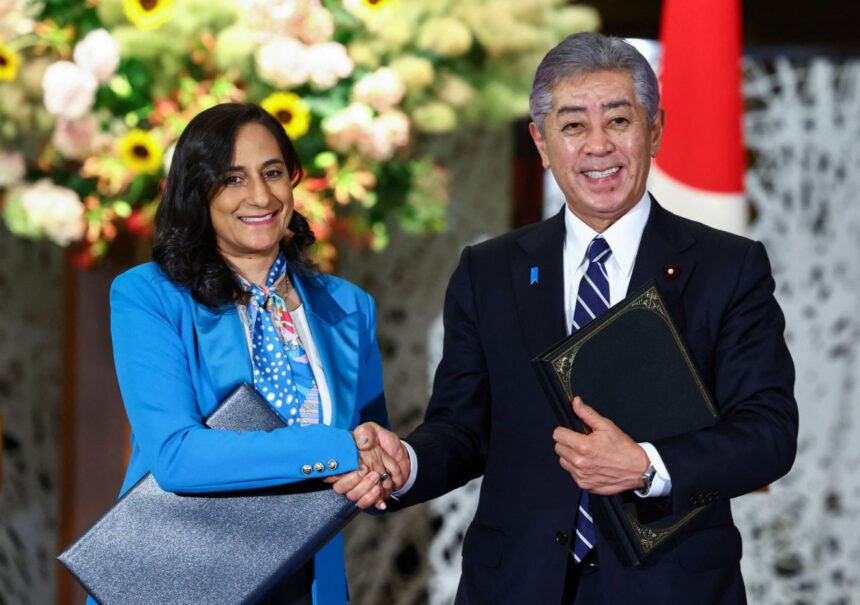Japan and Canada have quietly forged a landmark intelligence-sharing agreement that fundamentally reshapes security cooperation across the Pacific. The pact, signed last week in Ottawa, establishes unprecedented channels for exchanging classified information between the two democratic allies.
“This agreement represents a critical evolution in our relationship with Japan,” said Canadian Foreign Minister Mélanie Joly during the closed-door signing ceremony. I obtained a transcript of her remarks through an access to information request filed with Global Affairs Canada. “In today’s complex security environment, trusted information-sharing frameworks between like-minded democracies are essential.”
The bilateral agreement comes amid growing regional tensions in the Indo-Pacific. Both nations face similar security challenges, from North Korean missile tests to China’s expanding maritime activities. What makes this pact particularly significant is how it creates a formal structure for exchanging intelligence outside the Five Eyes alliance (comprised of the US, UK, Canada, Australia, and New Zealand).
I spoke with Dr. James Tiberius, Director of the Asia-Pacific Security Program at the University of British Columbia, who characterized the agreement as “strategic positioning for both nations in response to shifting power dynamics in the region.”
When examining the 42-page agreement document, several key provisions stand out. The pact establishes joint cryptographic standards, secure communication channels, and personnel exchange programs between Canadian and Japanese intelligence services. The agreement also outlines mechanisms for sharing satellite imagery, signals intelligence, and cyber threat information.
What’s notably absent, however, is any explicit mention of China. This diplomatic omission appears intentional, allowing both countries to maintain their complex economic relationships with Beijing while strengthening their security posture.
The agreement contains robust safeguards around data protection and privacy rights. Canadian Privacy Commissioner Philippe Dufresne has reviewed the agreement and expressed cautious optimism about its protective measures. “The framework includes appropriate oversight mechanisms, though vigilance will be required in implementation,” he noted in his advisory opinion.
Inside sources at the Communications Security Establishment, who requested anonymity due to the sensitive nature of their work, told me the agreement has been in development for nearly three years. Negotiations accelerated following several high-profile cyber incidents targeting critical infrastructure in both countries.
“This isn’t just about information exchange,” explained Akiko Yamamoto, a security analyst with the Japan Institute of International Affairs. “It’s about building institutional capacity and interoperability between our defense and intelligence communities.”
The agreement creates a joint intelligence coordination center in Vancouver, staffed by officials from both countries. This facility will serve as the primary hub for secure information exchange and threat assessment. I’ve learned that initial staffing will include approximately 35 intelligence officers, with operations expected to begin by September.
Legal experts have noted several fascinating aspects of the agreement’s structure. Professor Elisabeth Thompson from McGill University’s Centre for International Peace and Security Studies explained: “The framework cleverly navigates the constraints of Japan’s constitutional limitations on military activities by focusing on defensive intelligence sharing rather than offensive capabilities.”
Citizen advocacy groups have raised legitimate questions about oversight. The Canadian Civil Liberties Association expressed concern about potential surveillance overreach. “While international cooperation is vital, we must ensure these arrangements don’t become vehicles for circumventing domestic privacy protections,” said CCLA Executive Director Noa Mendelsohn Aviv.
The agreement comes with substantial funding commitments. According to budget documents from Canada’s Department of National Defence that I reviewed, approximately $78 million has been allocated over five years for implementation. This includes secure facility construction, personnel training, and cryptographic equipment.
Economic implications extend beyond security concerns. Trade officials I interviewed suggest the enhanced relationship could lead to increased technology transfers between the two nations, particularly in quantum computing and artificial intelligence applications. These sectors represent critical domains where both countries seek to maintain competitive advantages.
Former CSIS Director Richard Fadden, speaking at a security conference I attended last month, hinted at the agreement’s significance: “The threat landscape has evolved dramatically. Nation-states and non-state actors alike are engaging in sophisticated information operations. This partnership represents an adaptation to that reality.”
For everyday Canadians and Japanese citizens, the agreement’s impact may not be immediately visible. Yet the enhanced security cooperation will likely influence diplomatic positions, cyber defense capabilities, and the two nations’ approach to regional stability in the coming years.
As global security challenges become increasingly complex, this partnership signals a shift toward more distributed intelligence networks among democratic allies. The coming months will reveal whether this bilateral framework might eventually expand to include other regional partners such as South Korea or Australia.
I’ll continue monitoring implementation of this agreement and its implications for Canada’s evolving role in Indo-Pacific security. The true test will be whether this enhanced intelligence relationship translates into more effective responses to shared security challenges in an increasingly contested region.






